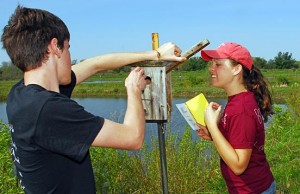 More often than ever before, people from all walks of life – from retired senior citizens to young families – are helping scientists collect data that support research projects. This movement of “citizen science” has flourished over the past decade as technology has advanced, allowing volunteers to share information with researchers quickly and accurately.
More often than ever before, people from all walks of life – from retired senior citizens to young families – are helping scientists collect data that support research projects. This movement of “citizen science” has flourished over the past decade as technology has advanced, allowing volunteers to share information with researchers quickly and accurately.
In fact, there are several interesting examples of “citizen science” here at Cornell University, including a survey of backyard birds and a project called Yardmap that encourages homeowners to map their yards so that researchers can better understand the habitat available to birds.
This month, a group of researchers from the United Kingdom has published a review that details exactly how “citizen science” is working, including summaries of projects across the globe, interviews with scientists who use this data and , and a guide of the best practices for conducting these types of projects. The review found some interesting conclusions. Among them:
- The motivation for citizen scientists varies greatly. Successful projects tend to take into account the interests and skill-sets of participants, and their expectations.
- Getting feedback from volunteers is an important component of a sucessful project and is acheived through a wide variety of mediums, including social media and face-to-face interactions.
- Technologies such as GPS and smart phones have made it easier for citizens to share accurate data, but relying on these devices excludes those who don’t have access to them.
Cornell gerontologist Karl Pillemer is a proponent of “citizen science” for people in their 60s, 70s and 80s. He has conducted research that found that older adults who get involved in creating a sustainable society and conserving natural resources are not only helping the environment, they are also helping themselves.
“Research shows that citizen science activities provide a wonderful opportunity to achieve two goals at once: Adding to our knowledge about areas important to quality of life for people, while also providing opportunities for rewarding and meaningful activity,” he said. “And citizen science activities can be adapted for any life course stage, from elementary school students to retirees.”
In short, projects that use citizen volunteers to collect data are an important part of environmental research today, and understanding the best practices for this type of research is important.



[…] (typeof(addthis_share) == "undefined"){ addthis_share = [];}Here at EBL, we’ve written before about the impact of volunteering on public health. In fact, Cornell gerontologist Karl Pillemer […]